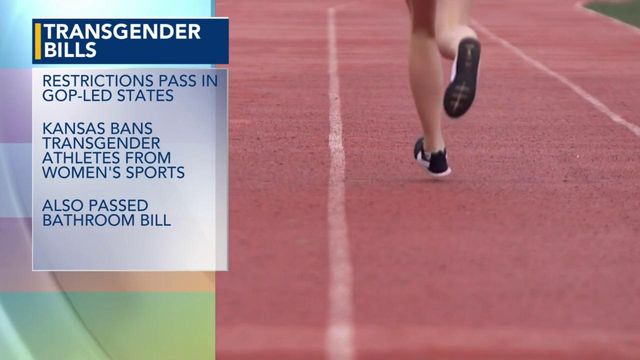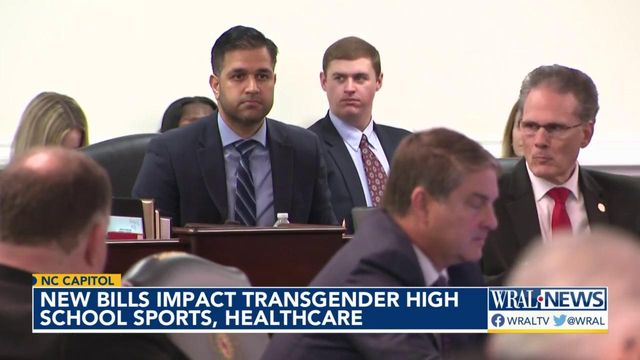NC Republicans file 6 bills impacting transgender youth
North Carolina Republicans have introduced a suite of bills impacting health care and sports participation for youth who identify as transgender.
One would ban people whose birth certificates say they are male from playing on girls middle school or high school sports teams in North Carolina. Another would limit gender-affirming treatment for people under 18. In total, six bills were introduced, all targeting young people who identify as transgender. Some of them limit gender-affirming treatment for people under 18.
On April 18, the Senate Education committee is scheduled to consider of the "Fairness in Women's Sports Act."
"We are excited to see the fairness in women's sports bill get filed and we hope it will pass," said Tami Fitzgerald, executive director of the NC Values Coalition.
Lawmakers introduced the same bill in 2021, doing so on the five-year anniversary of HB2, the so-called "bathroom bill."
At least 20 states, many in the southeast, have passed state laws prohibiting transgender high school athletes from participating based on their gender identity. At least 13 states, including Indiana and Idaho which became the latest, have bans on gender-affirming care for minors.
The organization in charge of high school sports in NC said there are only about 15 transgender athletes playing this year. The commissioner said she has seen little to no impact from their participation.
"This is devastating for families already undergoing the hardship of trying to access healthcare," said Allison Scott, the director of policies and programs at the Campaign for Southern Equality.
For Scott, these bills are personal because she identifies as trans and worries about the impact of what could become law.
"It is nothing but bullying and this continuation of the far right inserting themselves in families and into their children's healthcare," Scott said.
Republicans, now with veto-proof majorities in both chambers, filed legislation earlier in April dealing with the types of treatment that doctors can provide transgender youth and prohibiting transgender athletes from participation based on their identity, no doubt setting up fights with Democrats.
The Senate deadline to file bills for the year was April 6. The House deadline isn't until April 25.
- Senate Bill 560, the Medical Treatment for Minors Act, would prohibit health care providers from performing "gender transition procedures to any individual under 18 years of age" unless certain criteria are met. The criteria includes visits to a psychiatrist for at least six months and the signatures of both parents.
- Senate Bill 639, the Youth Health Protection Act, would prohibit the prescribing or administering of puberty blockers to youth. It would also prohibit certain surgeries, a mastectomy, genital construction or removing otherwise healthy or non-diseased body parts or tissue.
- Senate Bill 641, the Medical Ethics Defense (MED) Act, would allow a medical practitioner, health care institution or health care payer "not to participate in or pay for any health care service which violates his, her, or its conscience." They could not be held civilly, criminally or administratively liable, according to the legislation.
- Senate Bill 631 and House Bill 574, Fairness in Women's Sports Act, would prohibit transgender athletes from participating in sports consistent with their gender identity. Sex, for athletic participation, "shall be recognized based solely on the student's reproductive biology and genetics at birth."
- Senate Bill 636, School Athletic Transparency, is a wide-ranging bill that deals with high school athletics. But it includes "biological participation requirements" that states again that "shall be recognized based solely on the student's reproductive biology and genetics at birth.
Rep. Tricia Cotham switched from the Democratic Party to the Republican Party earlier in April, giving House Republicans a veto-proof super majority in the chamber. Senate Republicans have had a veto-proof super majority since the session began in January.
Cotham declined comment on the bills to WRAL News on April 5 saying she had not yet seen them. Cotham's platform in 2022 said that "LGBTQ+ youth are under attack by Republican state legislatures across the country. I will stand strong against discriminatory legislation and work to pass more protections at the state level."
"We are outraged to see lawmakers target our most vulnerable youth," Equality NC executive director Kendra R. Johnson said in a statement. "Banning kids from playing sports because of who they are prevents them from having positive and formative experiences at school. And preventing parents from making decisions on their child’s healthcare is harmful and life-threatening.
"These bills do nothing to address the real issues facing our youth, like gun violence in schools or the mental health crisis. Instead of working to make schools safe environments, our lawmakers are bullying queer and trans kids."
Fitzgerald is a supporter of two bills that put restrictions on transgender athletes.
"These bills are to protect children and to protect women," said Fitzgerald. "Women deserve to have a level playing field in sports. That's the purpose of Title IX."Republicans have scheduled a press conference for Thursday morning to discuss the the "Fairness in Women's Sports Act."











